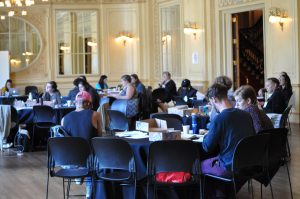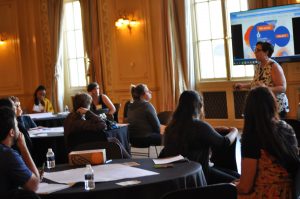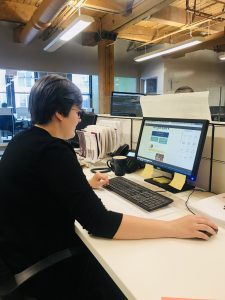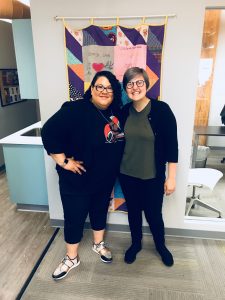Alright, it’s week eight in your internship. The end of summer is approaching, and you’re a couple weeks from finishing. What should you do now? You’ve asked the questions, given your input, and tried to be the best intern you could be, but what happens now?
I feel like there’s a shift that takes place over the course of an internship. I think you could consider the ‘shift’ like a series of stages. Stage one is what I like to call the “oh s**t” phase; you’re just figuring things out, and you’re not sure yet if you’ve got what it takes to handle it yet. And, from what I’ve learned, the only way to get to stage two (the “I get this, but not that” phase) is to be confident in your own ability to succeed.
In stage one, I was afraid of letting my supervisors down and letting Ingenuity down, because I thought I didn’t know enough to make meaningful contributions. Then I realized, no one knows everything. While I didn’t know, for example, what quality arts indicators are most equitable and student focused, I did understand how to think through the problems myself. Is requiring all schools to have their musical instruments in-tune equitable? Student-focused? My colleagues decided “no.” But I thought there was something there, so I gave my opinion (me, as a non-arts education expert). I said that while it’s not fair to require schools to make their instruments in-tune when they could be funding more student-oriented opportunities, it is an important to know whether or not students have access to quality tools that allow them to create effectively. While I haven’t been exposed to the entire conversation surrounding arts education in Chicago for the past several years, I was able to trust, draw upon, and offer my perspective. It got others in the room thinking differently about how they saw the problem. So in trusting myself, I moved to stage two which is where I am now.
Stage two is all about confidence, professionalism, and enthusiasm; you’ve got to have ‘em. This is because it’s easy to become the underdog… the millennial… the kid in the office. It’s important to explicitly show what you understand while professionally asking for clarity. My favorite line has become, “what I’m hearing from you is [this], am I understanding you correctly?” This allows you to show that you are engaged in what your supervisor is saying while also asking about what you don’t know. Being the kid means sometimes your supervisors and colleagues over-explain things (this is likely because it totally looked like you were in over your head on week one– and that’s okay). Just remember: exude confidence which equals trusting, drawing upon, and offering your perspective. Once you’ve mastered that, you move on to the final stage: the “what now?” stage.
This is what I’ll be entering as I step into week nine of my internship on Monday morning. What now? I feel comfortable doing the job I came here to do and sharing my opinions, so what’s next for my to accomplish other than more experience? Exactly. You should now, at the end of your internship, start asking yourself if you’re getting the experience out of this professional opportunity that you’d hoped. At the beginning of the summer, hopefully, you made a list of what you’d like to learn how to do or get better at. It’s time to check-in. Did you accomplish everything? My starter list was to get better at networking, get better at communicating, get better at public speaking, and understand how to use this experience to show my professional capability. I think I’ve gotten fractionally better at each, but now it’s the last lap and I’m running out of time to get it all done.
Enter, stage four.
Focus on your goals. You know what you need to do to finish your internship projects, and it’s time to bring your goals to a more forward place in your mind. Make a list of which experiences you think would help you check-off your goal list. For me, that’s reaching out to more folks at the big event next week, checking-in more regularly with my supervisor, helping to present our final instructional session, and identifying through-lines in the skills I learned and the next position I’d like to apply for. Wish me luck!
Cheers!



